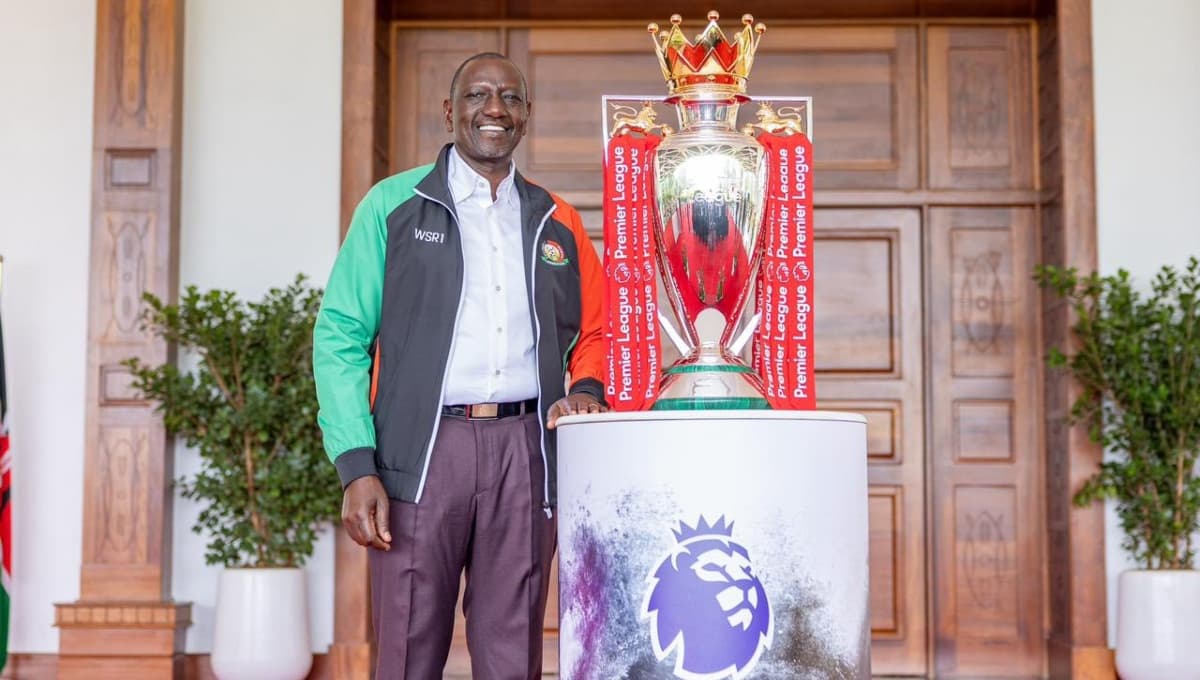We're loading the full news article for you. This includes the article content, images, author information, and related articles.
President Ruto welcomed the iconic Premier League trophy to State House, but unlike the World Cup, strict, often unwritten, protocols govern who can actually touch football's most coveted prizes.

The prestigious English Premier League (EPL) trophy arrived at State House, Nairobi, on Friday, 24 October 2025, where it was officially received by President William Ruto. The visit, part of a promotional tour, has ignited excitement among Kenya's passionate football fanbase and raised questions about the intricate protocols surrounding the handling of such iconic sporting symbols.
While the President, an avid Arsenal fan, posed next to the silverware, it was noted he did not hold or lift it. This observation highlights a complex web of rules and traditions that differentiate the Premier League trophy from its global and European counterparts, the FIFA World Cup and UEFA Champions League trophies.
The regulations governing these three major football trophies vary significantly, creating a hierarchy of accessibility.
For the FIFA World Cup Trophy, the rules are surprisingly clear and permit a select few to handle it. According to FIFA's regulations, only a very exclusive group, which includes tournament winners (players and coaches) and incumbent heads of state, are allowed to touch the trophy with their bare hands. This protocol explains why a sitting president, like William Ruto, would be permitted to hold the World Cup trophy during an official tour.
The UEFA Champions League (UCL) Trophy operates under much stricter guidelines. UEFA's official regulations state that the original trophy remains in UEFA's possession at all times. Winning clubs are awarded a full-size replica. While there is no explicit public rule about touching, the tradition is firmly that only players who have won the tournament and club officials have the privilege of lifting it. During a previous UCL trophy tour in Kenya, President Ruto was allowed to touch and hold the trophy but not lift it, underscoring the stringent controls UEFA maintains.
The protocol for the Premier League Trophy appears to be the most ambiguous of the three. Unlike FIFA and UEFA, the Premier League does not have widely published, explicit rules forbidding dignitaries from touching the trophy. Some reports suggest there is no known official prohibition. However, during the trophy's visit, a local official affiliated with one of the tour's global partners reportedly informed a Kenyan media outlet that only past and current winners are permitted to touch it, a rule that would exclude the Head of State. This remains an unconfirmed detail from the Premier League itself, but the President's decision to pose without touching the trophy lends it credence. FURTHER INVESTIGATION REQUIRED.
The discussion around who can touch these trophies invariably leads to the elite group of players who have earned the right to lift all three through victory. Winning the domestic league, the continental championship, and the World Cup is considered one of football's ultimate achievements. To date, only seven players in history have won the Premier League, the UEFA Champions League, and the FIFA World Cup.
The exclusive list of players is as follows:
Julián Álvarez is the most recent and only player to have won the World Cup and a continental treble (league, primary domestic cup, and Champions League) in the same season, achieving this feat with Argentina and Manchester City in the 2022-2023 season.
The Premier League trophy's visit holds significant weight for Kenya, a nation with a massive and devoted following of English football. President Ruto remarked on this passion during the reception, stating, “Kenya is, without a doubt, a football-crazy nation. We don't just watch the Premier League; we live it, breathe it, and argue about it every weekend.”
The tour, sponsored by Guinness, provides a rare opportunity for local fans to see the iconic silverware up close at events scheduled in Nairobi over the weekend. Such events underscore the deep connection between Kenyan fans and global football, a relationship built over decades of following legendary clubs and players. The presence of these trophies on Kenyan soil serves as both a celebration of this passion and an inspiration for the country's own aspiring football talent.
Keep the conversation in one place—threads here stay linked to the story and in the forums.
Sign in to start a discussion
Start a conversation about this story and keep it linked here.
Other hot threads
E-sports and Gaming Community in Kenya
Active 9 months ago
The Role of Technology in Modern Agriculture (AgriTech)
Active 9 months ago
Popular Recreational Activities Across Counties
Active 9 months ago
Investing in Youth Sports Development Programs
Active 9 months ago